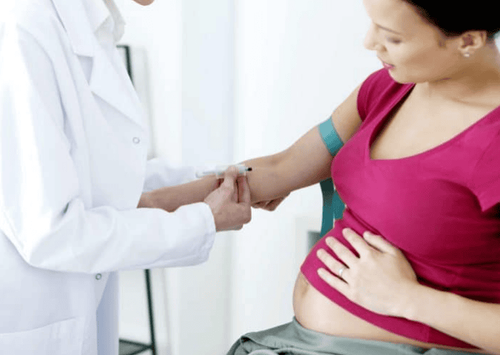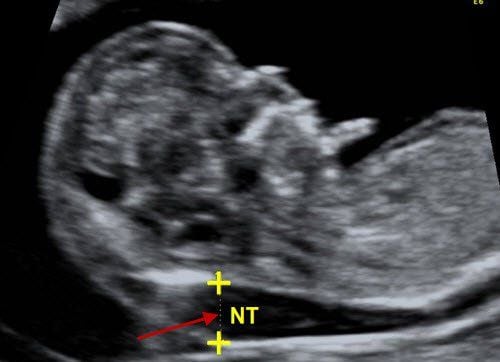This is an automatically translated article.
The article is expertly consulted by Master, Doctor Le Nhat Nguyen - Obstetrician-Gynecology Specialist - Vinmec Danang International General Hospital. Doctor has more than 20 years of experience in the field of Obstetrics and Gynecology.Birth defects are a concern for couples who want to have children because it causes very severe consequences, even death for babies in the first years of life. So how to reduce the risk of birth defects during pregnancy? The article will provide you with useful information as well as effective ways to prevent birth defects.
1. What are birth defects?
A birth defect is a structural or functional abnormality (eg, a metabolic disorder) in the fetus and can be identified before birth, at birth, or later in life. Some birth defects can be seen soon after a baby is born, such as clubfoot or extra fingers or toes.2. What causes birth defects?
Some birth defects are hereditary, which can be passed from parent to child. In addition, if the mother uses drugs without a doctor's prescription, or is exposed to toxic chemicals during pregnancy, there is also an increased risk of birth defects for the fetus. However, there are still many cases of birth defects with no identifiable cause.3. What factors increase the risk of having a baby with a birth defect?
Most pregnant women are at risk of having a baby with a birth defect. Here are the top factors that increase the risk:Older women (over 35) Having a family or personal history of birth defects Have had a child with a birth defect Use certain medications without a doctor's prescription during pregnancy Have health conditions such as diabetes or obesity Use stimulants such as drugs, alcohol, or tobacco during pregnancy.
4. Ways to reduce the risk of having a baby with birth defects before pregnancy

Pre-marital and pre-pregnancy reproductive health screening to determine the health status of couples. Take a daily multivitamin before and during pregnancy. Maintain a healthy weight. Do not arbitrarily use drugs during pregnancy without a doctor's prescription. Ensure a safe environment, avoid toxic elements. Build a healthy lifestyle: do not use stimulants such as alcohol, tobacco, or unsafe foods. Prevent infection.
5. Why take a multivitamin before and during pregnancy?

Notes about taking drugs during pregnancy Some drugs can increase the risk of birth defects, so the use of drugs during pregnancy should be considered by a doctor to evaluate the effect of the drug on the fetus. pediatric. You should check for safety before using over-the-counter medications such as pain relievers, laxatives, cold or allergy medications, vitamins, or herbal products and skin treatments.
Effects of obesity on pregnancy Obese women, with a body mass index (BMI) of 30 or more, during pregnancy have a higher risk of having a baby with birth defects than women with normal weight. The most common obesity-related birth defects are neural tube defects, heart defects, and cleft palate. If you are planning to become pregnant, the best way to prevent problems caused by obesity is to maintain a healthy weight before you become pregnant.
Why should not drink alcohol during pregnancy? Alcohol can interfere with the normal development of the fetus and cause birth defects. If a pregnant woman drinks alcohol during pregnancy, the fetus can have physical, intellectual, behavioral and learning disabilities. These problems have long-term effects on children's health. It is best not to drink alcohol during pregnancy, or if you are "addicted" to alcohol, try to quit to ensure the full development of the fetus.
Effects of illicit drugs on pregnancy Use of drugs such as heroin, cocaine, methamphetamine and prescription drugs used for non-medical reasons during pregnancy can cause birth defects and miscarriage . During the last weeks of pregnancy, illegal drugs can interfere with fetal growth, causing premature birth and fetal death.
If a pregnant woman uses marijuana during pregnancy, it can increase the risk of stillbirth and abnormal birth weight. Ideally, pregnant women should avoid using marijuana so as not to affect the development of the fetus.
6. Effects of infectious diseases on pregnancy
Certain infections can increase the risk of birth defects and other problems during pregnancy:Rubella (German measles) is a viral infection that usually causes a rash and low-grade fever. Getting rubella during pregnancy can cause miscarriage or lead to deafness, intellectual disability, heart defects, and blindness in the newborn. Although a vaccine against rubella is available, it is not recommended for pregnant women. If you haven't had the disease or been vaccinated, you should get the rubella vaccine at least 1 month before you become pregnant. Toxoplasmosis is a disease caused by a parasite that lives in the soil. You can become infected by eating raw or undercooked meat, unwashed vegetables, or coming into contact with animal feces such as dogs or cats. Toxoplasmosis can cause birth defects, including hearing loss, vision problems, and intellectual disability. Sexually transmitted infections (STIs) can cause serious birth defects. Ideally, you should be treated for an STI before you become pregnant. Cytomegalovirus (CMV) is a common viral infection. Most CMV infections do not cause serious problems. In rare cases, the infection can cause intellectual disability, hearing loss, and vision problems. CMV can be spread through contact with infected children's urine or other body fluids. Some birth defects prevention: A few precautions recommended for all pregnant women include:
Limit your exposure to mercury by not eating shark, swordfish, and mackerel. or tile fish. Avoid contact with lead. Lead is commonly found in paints, building materials, jewelry, and ceramics. Limit the use of vitamin A because too much vitamin A can cause serious birth defects. You should consume no more than 10,000 IU per day. NIPT test is an effective non-invasive prenatal screening method being consulted by doctors at Vinmec International General Hospital with pregnant mothers, helping to detect abnormalities in chromosome number and structure. of the fetus during pregnancy. Thanks to the non-invasive prenatal screening method based on testing the fetal DNA in the mother's blood, doctors can detect fetal abnormalities as early as 9 weeks old instead of having to wait until 12 weeks like. and reduces the risk of miscarriage compared with conventional amniocentesis.
Please dial HOTLINE for more information or register for an appointment HERE. Download MyVinmec app to make appointments faster and to manage your bookings easily.
Articles refer to the source Acog













